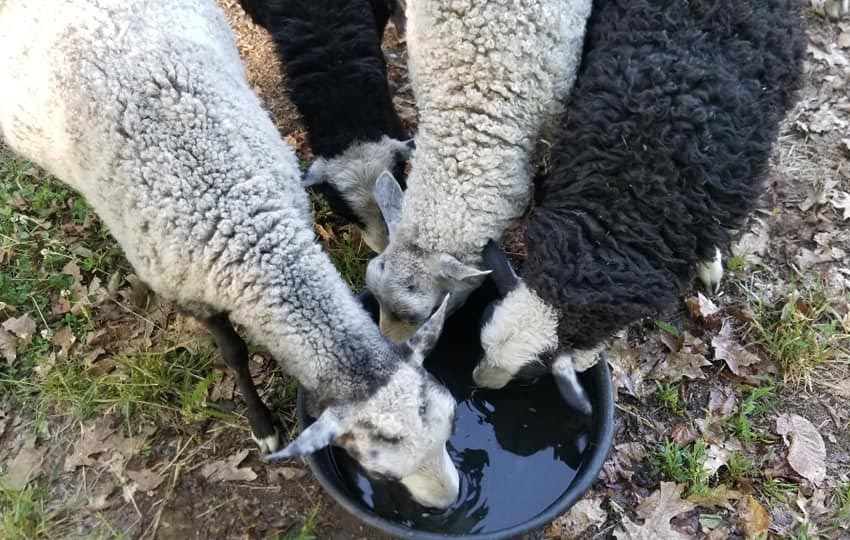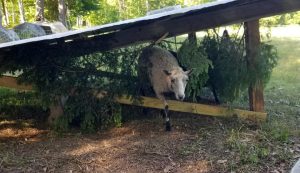
Prevent and Manage Heat Stress in Your Livestock
By Rachel White, Ph.D., Assistant Extension Professor, University of Maine Cooperative Extension
Summer weather is finally here! While us humans do have the ability to escape the heat, our livestock may need additional assistance in times of weather changes, including extreme heat cycles. Below are a few tips to help our furry and feathered friends be comfortable in the summer heat and how to identify heat stress.
- Check the weather forecast. If it is hot for you, it is hot for them. High heat is an obvious factor, however the addition of high humidity can impact the effectiveness of an animal’s natural cooling responses, such as panting and sweating, potentially leading to heat stress. Using a Temperature Humidity index (THI) chart, like the example below, for specific animal species can help inform management decisions.
- Click to enlarge. Example of a Temperature Humidity Index (THI) for dairy cows. Ranges for heat stress: Yellow is mild, orange is moderate, and red is severe risk. (Full descriptive text: A cross chart of temperature (in Fahrenheit) and relative humidity, where values are crossed to give the heat index. The heat index range of 72 degrees to 78 degrees is mild risk, 79 degrees to 89 degrees is moderate risk, and 90 degrees and above is severe risk of heat-induced stress. – Graphic, UMaine Extension)
- Always keep water clean and accessible.
-

Sheep under shelter in the shade. Cedar and fir boughs added to help with fly relief. – UMaine Extension Photo Provide sources of cover and cooling. Lean-to structures, barns, tree cover, or homemade canopies can limit the direct sunlight. Ensure shade coverage space to fit all animals. Barns should be well ventilated, and the use of fans can create air movement. Misting and sprinkler systems can be installed to help cool animals down, though it is recommended to pair this with fanning systems to prevent creating a more humid environment. Keep cooling areas clean, as excessive manure buildup can result in other health problems such as parasite and bacterial spread.
- Turn out in the cooler parts of the day. Though food should be available during the day, the metabolization of meals creates internal heat so animals may choose to actively eat when it is cooler.
- Cold baths. Some animals, such as horses, might benefit from being hosed down. Make sure the water is wicked away after, as high heat and humidity can reduce the effectiveness of water evaporation from the coat and can cause overheating. Never hose down a woolly sheep for this reason.
- Transport and work animals in the cooler parts of the day. For many animals, transporting is stressful in and of itself. Prevent heat stress by hauling in the early morning or in the evening. Likewise, work with animals before or after the high heat period of the day.
- Shear long haired or woolly animals. Sheep in wool and other animals with thicker coats are more prone to heat stress. Shearing before heat events can help mitigate heat stress risk.
Signs and management of heat stress
Signs of heat stress include excessive panting (open mouth breathing), sweating, increased respiration rate and rectal temperature, depression, and decreased dry feed intake. This can lead to poor performance, such as decreased milk yield and reproductive ability, and can create secondary health impacts like increased internal parasite activity. Electrolytes added to a water source after observed heat stress can help replace mineral and electrolyte loss.
Contact your veterinarian if you think your animal has been significantly affected.
Resources:
- Pugh, D. G., Baird, A. N., Edmondson, M. A., & Passler, T. (2021). Sheep, goat, and cervid medicine (Third edition.). Elsevier.
- Fathoni A, Boonkum W, Chankitisakul V, Duangjinda M. An Appropriate Genetic Approach for Improving Reproductive Traits in Crossbred Thai-Holstein Cattle under Heat Stress Conditions. Vet Sci. 2022 Mar 28;9(4):163. doi: 10.3390/vetsci9040163.
In complying with the letter and spirit of applicable laws and pursuing its own goals of diversity, the University of Maine System does not discriminate on the grounds of race, color, religion, sex, sexual orientation, transgender status, gender, gender identity or expression, ethnicity, national origin, citizenship status, familial status, ancestry, age, disability physical or mental, genetic information, or veterans or military status in employment, education, and all other programs and activities. The University provides reasonable accommodations to qualified individuals with disabilities upon request. The following person has been designated to handle inquiries regarding non-discrimination policies: Director of Equal Opportunity, 5713 Chadbourne Hall, Room 412, University of Maine, Orono, ME 04469-5713, 207.581.1226, TTY 711 (Maine Relay System).

